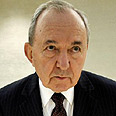
WASHINTON – Many raised their brows when Judge Richard Goldstone retracted his tough stance against Israel in the controversial Goldstone Report, which accused the Jewish State of committing war crimes during Operation Cast Lead.
A New York Times article published on Wednesday tries to trace the reasons behind Goldstone's sudden change of heart.
According to the article, Goldstone's successful involvement in the resolution of the long-lasting conflict between the minority white government and the majority black population in his home country of South Africa may hold a clue.
Goldstone, described in the article as a Zionist and long-time Israel supporter who believes in international law as a way to achieve reconciliation, truly hoped that the UN-sponsored fact-finding mission into the war in Gaza between Israel and Hamas will help pacify the region.
However, the Goldstone Report did no such thing, instead stirring a storm in Israel and throughout the Jewish community after accusing both sides of targeting civilians.
'Extremely hurt'
In trying to dig deeper into the reasons that led the South African judge to taking such a sharp turn, New York Times reporters interviewed two dozen people who are acquainted with Goldstone.
The interviewees suggested a combination of factors leading to the shift in attitude, including "hostility from his community, disappointment about Hamas’s continuing attacks on civilians, and new understanding of Israel’s conduct in a few of the most deadly incidents of the war."
“I know he was extremely hurt by the reaction to the report,” Aryeh Neier, president of the Open Society Foundations and a close acquaintance of Goldstone told the New York Times.
“I think he was extremely uncomfortable in providing some fodder to people who were looking for anything they could use against Israel,” he said in an attempt to rationalize Goldstone's Washington Post essay, published on April 1, in which he softened his tough position against Israel.
In the essay, which was rejected by the other members of the fact-finding mission, Goldstone noted that "If I had known then what I know now, the Goldstone report would have been a different document.”
'Slow, gradual shift'
In the year and a half that has elapsed since the report was published, Goldstone received accolades from the Arab world and anti-Israeli left wing elements, but was harshly denounced by those he identified with.
One of his daughters, who lived in Israel and currently resides in Canada, was furious with him for a long time, and he unable to attend his other daughter's son's Bar-Mitzvah, due to the Jewish community's intention to hold a protest during the event.
“He told me last year that he was dreaming of the day when he would be able to sleep again at night,” a friend who asked to remain anonymous told the NYT.
Another friend, Maurice Ostroff, was quoted as saying that Goldstone's retraction was a result of a "slow, gradual rethinking,” adding that the south African Jew “was upset by the misuse of those who accused Israel of being an apartheid state, but mostly, as new information came out, he shifted his thinking."
An additional factor that led to Goldstone's gradual shift was the gap between Israel and Hamas' versions vis-à-vis the number of casualties.
"Israel has maintained that about 700 of the dead, which it put at 1,166, were combatants. Palestinian estimates put the total at more like 1,400 and the number of combatants at only a few hundred," the article stated.
- Follow Ynetnews on Facebook















